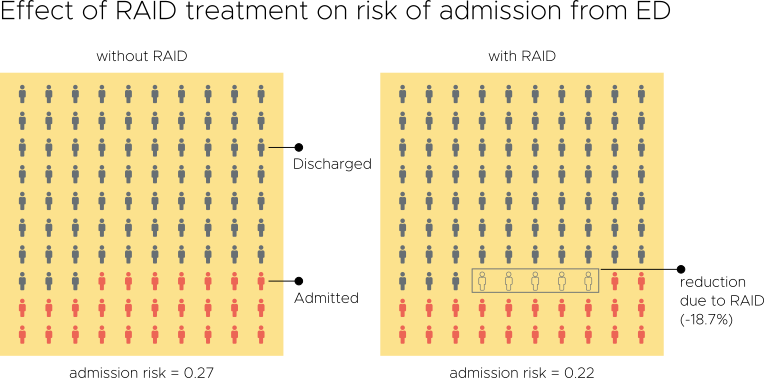A high proportion of patients treated for physical health conditions also have co-morbid mental health problems; and there is growing acceptance of a need to raise awareness of mental health issues in acute hospitals and improve the experience of care and treatment for this group.
In response to such challenges, the Northern Health and Social Care Trust, one of five health and social care trusts in Northern Ireland, introduced a specialised multidisciplinary mental health liaison team—known as Rapid Assessment Interface and Discharge service[1]. The Rapid Assessment Interface and Discharge model involves rapid assessment of patients presenting to the ED with mental health, self-harm or substance misuse needs and those admitted to general hospital wards so that they can receive appropriate interventions for their physical and mental health, either in the community or in hospital. The Trust wanted to understand the effectiveness of the Rapid Assessment Interface and Discharge service and be sufficiently confident in the conclusions to make decisions about long-term funding for the service.
We worked with the Trust to design a quantitative evaluation study capable of providing reliable inference about the effectiveness of the new service. A retrospective matched cohort study design was used to compare likelihood of admission from the emergency department and average length of stay for patients treated by 'Rapid Assessment Interface and Discharge' with a matched comparison group of similar patients treated in other acute hospitals in the region.
All research into cause-and-effect relationships, faces the challenge of maximising similarity of groups being compared to ensure fairness of the comparison and unbiasedness of the findings. We applied a novel matching algorithm—genetic matching[2]— to select a group of comparison patients. Simulation studies have shown genetic matching achieves better covariate balance and produces more stable and unbiased treatment effect estimates[3].
Our study found, for patients treated by the Rapid Assessment Interface and Discharge service in the ED their average risk (or chance) of admission was 18.7% lower (95% confidence interval –9.3% to –27.3%). Average length of stay for a wider group of patients treated on general wards (including those benefitting indirectly from the presence of 'Rapid Assessment Interface and Discharge' Service) was 10.8% lower (95% confidence interval
–9.2% to –12.4%). Both findings were statistically highly significant (P <0.001).
The findings from our evaluation were instrumental in decisions that have led to the Rapid Assessment Interface and Discharge service in the Northern HSC Trust moving to a more sustainable footing
[1] The first Rapid Assessment Interface Discharge service was established in City Hospital in Birmingham (England) in 2009.
[2] Sekhon JS. Multivariate and Propensity Score Matching Software with Automated Balance Optimization: The Matching Package for R. Journal of Statistical Software. 2011;42(7): 1–52.
[3] Diamond A, Sekhon JS. Genetic Matching for Estimating Causal Effects: A General Multivariate Matching Method for Achieving Balance in Observational Studies. Review of Economics and Statistics. 2013;95(3): 932–945.
CC BY-NC-ND 4.0

This work is licensed under a Creative Commons Attribution-NonCommercial-NoDerivatives 4.0 International License.
